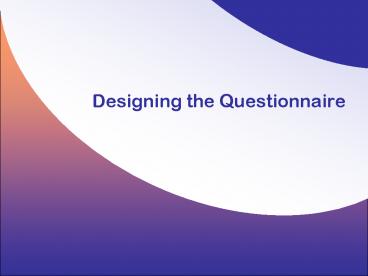Designing the Questionnaire PowerPoint PPT Presentation
1 / 15
Title: Designing the Questionnaire
1
Designing the Questionnaire
2
Value of Questionnaires in Marketing Research
- A questionnaire is a formal framework consisting
of a set of questions (scales) designed to
generate primary data - Questionnaire construction involves using a
process that takes established sets of
question/scale measurements and formats them into
a complete instrument
3
Steps in Questionnaire Design
- 1 Confirm research objectives
- 2 Select appropriate data collection method
- 3 Develop questions/scales
- 4 Determine layout and evaluate questionnaire
- 5 Obtain initial client approval
- 6 Pretest, revise, and finalize questionnaire
- 7 Implement survey
4
Questions and Scaling
- Quality of Question
- Bad Questions
- Unanswerable.
- Leading or loaded.
- Double-barreled questions.
- Type of Question Format
- Unstructured Questions
- Open-ended format where
- respondent replies in their
- own words.
- Structured Questions
- Closed-ended format where
- respondent responds from a
- set of possible responses.
5
Guidelines for Evaluating the Adequacy of
Questions
- Use simple words avoid technical terms
- Avoid qualifying phrases (e.g., always)
- Ensure response categories are mutually exclusive
- Ensure questions/scale items are
meaningful/understandable to the respondents - Avoid arranging response categories in a manner
that may bias responses - Do not double-barrel questions or response items
6
Considerations in Questionnaire Design_1
- Confirm the research objectives before designing
the questionnaire - Determine data requirements to complete each
research objective - Include a general description of the study in the
introduction section - Ensure instructions are clear
- Arrange questions in a logical order
7
Considerations in Questionnaire Design_2
- Begin with simple questions and then progress to
more difficult ones - Ask personal questions at the end
- Place sensitive questions towards the end
- Avoid asking questions using a different
measurement format in the same section of the
questionnaire - End with a thank-you statement
8
Role of a Cover Letter
Serves as an Initial contact
Encourages participation
Provides information about the study
Communicates the studys legitimacy
Improves response rates
9
Guidelines for Developing Cover Letters_1
- Personalize letter (i.e., not Dear Sir or Madam
- Identify sponsoring organization for study
- State purpose and importance of the study clearly
- Promise anonymity or confidentiality
- Clarify the general time frame for the study
10
Guidelines for Developing Cover Letters_2
- Reinforce the importance of subjects
participation - Acknowledge reasons for nonparticipation
- Provide information on the time required of
respondents as well as any compensation they
might receive - Explain when the survey should be completed
where and how to return survey - Thank respondents for participation
11
Other Documents Used in Collecting Data
- Supervisor instructions
- Interviewer instructions
- Screening forms
- Quota sheets
- Rating cards
- Call record sheets
12
Sample Screening-Quota Sheet
13
Sample Rating Card
14
Call Record Sheet Sample
15
Marketing Research in Action Santa Fe Grill
Questionnaire
- Does the questionnaire in its current form
illustrate good design principles? - Can the current survey capture the necessary
data? - Evaluate the screener. Are any changes needed?

